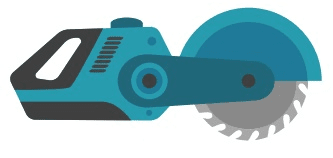24 Hours For Improving Best Circular Saw Cordless
The Best Cordless Circular Saws of 2023
In the world of power tools, cordless circular saws are a favorite among both professional specialists and DIY lovers. Their mobility, ease of use, and considerable developments in battery life have made them an important part of any toolkit. With a variety of models offered, it can be challenging to figure out which one is the best fit for your requirements. This post will explore a few of the top-rated cordless circular saws on the marketplace, comparing their functions, specifications, and user feedback to assist you make an informed decision.
Why Choose a Cordless Circular Saw?
Before diving into the specifics of private models, it's worth going over the advantages of cordless circular saws:
Portability: Unlike their corded equivalents, cordless saws do not need an electric outlet, enabling you to operate in remote locations or tight spaces without stressing about power sources.
Security: With no cords to trip over, the risk of mishaps is decreased.
Alleviate of Use: Many cordless models feature lightweight styles, making them more comfy to manage for extended periods.
Efficiency: Modern battery innovation has actually improved considerably, offering power levels similar to corded models.
Now, let's take a look at a few of the very best cordless circular saws currently available.
Design
Battery Voltage
Blade Diameter
Max RPM
Weight
Cost Range
DeWalt DCS570B
60V
7-¼”
5800
8.8 pounds
₤ 200-₤ 250
Makita XSH06Z
18V
7-¼”
5800
7.8 pounds
₤ 150-₤ 200
Milwaukee M18 FUEL
18V
7-¼”
5800
8.1 lbs
₤ 180-₤ 230
Bosch GKS18V-25GCL
18V
7-¼”
6000
9.4 pounds
₤ 170-₤ 210
Ryobi P508
18V
7-¼”
5500
6.9 pounds
₤ 120-₤ 160
1. DeWalt DCS570B
The DeWalt DCS570B is an effective 60V circular saw developed for durable applications. It features a 7-¼” blade and provides an optimal speed of 5800 RPM. Cordless Wood Saw is particularly notable for its lightweight design, weighing in at simply 8.8 pounds, making it simple to manage without compromising power.
Pros:
- Exceptional cutting power.
- Excellent battery life with fast charging.
- Durable and robust style.
Cons:
- Higher rate point.
- No battery or charger included (bare tool).
2. Makita XSH06Z
Makita's XSH06Z is another exceptional choice, running on an 18V battery. This design strikes a good balance between weight and efficiency, weighing only 7.8 pounds however still capable of reaching an optimum speed of 5800 RPM. Its lightweight style makes it ideal for long hours of usage.
Pros:
- Lightweight and simple to maneuver.
- Highly effective brushless motor.
- Excellent build quality.
Cons:
- Battery life may a little lag behind 60V models.
- Bare tool; battery offered individually.
3. Milwaukee M18 FUEL
The Milwaukee M18 FUEL circular saw is engineered for high performance and longevity. At 8.1 pounds, it's somewhat much heavier than the Makita but provides similar robust features. It also reaches a maximum speed of 5800 RPM and is geared up with innovative REDLINK PLUS ™ innovation for much better battery management.
Pros:
- High torque for fast cuts.
- REDLINK innovation helps avoid overload.
- Resilient with metal building.
Cons:
- Price can be greater than some competitors.
- Some users discover it less comfy for extended use.
4. Bosch GKS18V-25GCL
Bosch's GKS18V-25GCL offers versatility and efficiency. With a 7-¼” blade and weighing in at 9.4 pounds, it caters well to sturdy tasks. Its excellent maximum RPM of 6000 makes it one of the quicker models offered, and it includes a built-in LED light for boosted exposure throughout cuts.
Pros:
- High-speed performance.
- Integrated LED for much better sight.
- Excellent for both professionals and DIYers.
Cons:
- Heavier than some other models.
- Battery life might enhance under heavy usage.
5. Ryobi P508
For those seeking a more budget-friendly alternative, the Ryobi P508 is a standout. It runs on 18V and weighs just 6.9 pounds, making it extremely simple to manage. While it reaches a slightly lower optimum RPM of 5500, it remains a dependable tool for general-purpose cutting.
Pros:
- Lightweight and ergonomic style.
- Budget-friendly rate point.
- Good battery compatibility with other Ryobi tools.
Cons:
- Lower RPM compared to competitors.
- Might not appropriate for extremely heavy-duty jobs.
Frequently Asked Questions (FAQ)
Q: Can I use a routine circular saw blade with a cordless circular saw?
A: Yes, you can utilize routine circular saw blades with a cordless circular saw, supplied the blade size fits the saw's requirements.
Q: How long do battery charges typically last on cordless circular saws?
A: Battery life can vary considerably depending upon the model and the type of product you're cutting. Usually, anticipate a variety of 30 to 60 minutes for constant durable use.
Q: Are cordless circular saws ideal for professional use?
A: Yes, many cordless circular saws are created particularly for heavy-duty use in professional settings. It's essential to pick a model known for its power and dependability, such as those noted here.
Q: What maintenance do I require to perform on a cordless circular saw?
A: Regular maintenance consists of keeping the blade sharp, ensuring the battery is charged and saved appropriately, and occasionally cleaning up the saw to avoid dust buildup. Always refer to the producer's standards for particular recommendations.
Cordless circular saws are a must-have tool that brings benefit and effectiveness to both professional work and DIY projects. With models like the DeWalt DCS570B, Makita XSH06Z, Milwaukee M18 FUEL, Bosch GKS18V-25GCL, and Ryobi P508 all offering specialized features, users will find an appropriate option that fits their needs and budget. Purchasing a top quality cordless circular saw will make sure that cutting jobs are performed with precision and ease, making it an important addition to any tool collection.
